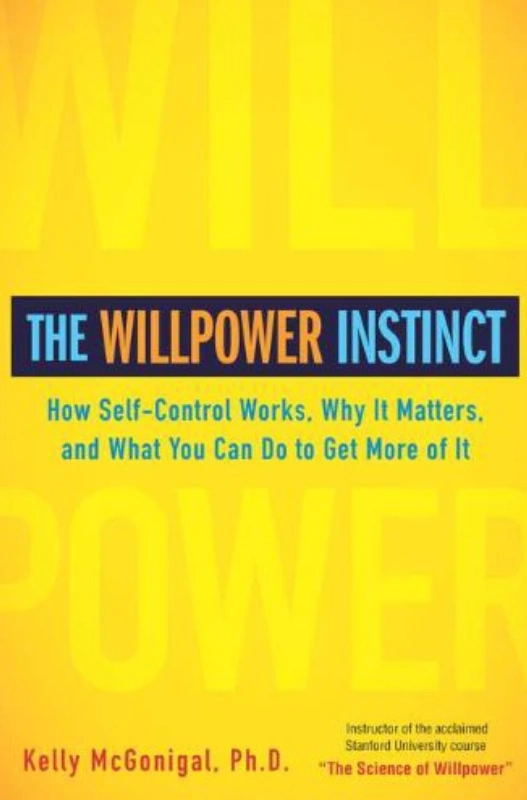
The Willpower Instinct reveals how self-control works through biology, psychology, and neuroscience. It teaches that willpower is not about being “strong” but about understanding your mind and body. Through mindfulness, stress management, and self-awareness, you can train your brain to resist temptation, stay focused, and achieve long-term goals. The book turns setbacks into lessons and shows how small changes lead to lasting transformation.
The Willpower Instinct by Dr. Kelly McGonigal is a groundbreaking exploration of self-control that transforms the way we understand willpower, not as a fixed trait, but as a learnable skill that can be strengthened like a muscle. Drawing from psychology, neuroscience, and behavioral economics, McGonigal distills the latest scientific research into an accessible, practical guide for overcoming temptation, breaking bad habits, and achieving personal goals. The book originated from a course McGonigal taught at Stanford University, where she noticed that simply understanding the science of willpower helped students change their behavior. This insight became the foundation of a book that has since empowered millions to master their minds and choices. Summary powered by VariableTribe
At the heart of the book is the idea that willpower is a biological and psychological system, a combination of mind, body, and emotion that can be trained. McGonigal introduces the concept of the “I will,” “I won’t,” and “I want” powers, which represent the three core components of self-control:
Most people focus only on “I won’t” power—trying to suppress cravings or stop bad habits, but McGonigal argues that true willpower comes from aligning all three. When your “I want” (your vision) is strong, your “I will” (action) becomes easier, and your “I won’t” (resistance) becomes more effective.
One of the most powerful insights in the book is that willpower is a limited resource, a concept known as ego depletion. Research shows that every act of self-control draws from a finite mental energy reserve. After making tough decisions, resisting temptation, or managing stress, your willpower weakens, making you more vulnerable to impulsive behavior. This explains why people often “fall off the wagon” late in the day or after a stressful event. The good news? Just like a muscle, willpower can be strengthened over time with consistent training.
McGonigal offers practical strategies to boost willpower:
The book also debunks common myths about self-control. For example, many people believe that motivation is the key to success. But McGonigal shows that motivation fluctuates, willpower is what carries you through when motivation fades. Others think that willpower is about sheer will, white-knuckling through cravings. But the science shows that the most effective strategies are not about force, but about designing your environment to reduce temptation and support good habits.
She introduces the “future self” connection, the idea that people are more likely to make healthy choices when they feel emotionally connected to their future selves. Studies show that visualizing your future self, writing letters to them, or even using digital avatars can increase saving, dieting, and long-term planning. This insight reveals that willpower is not just about restraint, it’s about identity and belonging. When you see your future self as “you,” you’re more likely to care for them.
Another key theme is the “moral licensing” effect, the tendency to reward yourself for good behavior with bad choices. For example, after exercising, someone might justify eating junk food. McGonigal explains that this happens because we see self-control as a burden, not a choice. To counter this, she encourages reframing willpower as an expression of your values, not a punishment. “I’m not giving up sugar,” becomes “I’m choosing health.”
The book also explores how social influence affects willpower. We are deeply influenced by the behaviors of those around us. If your friends smoke, you’re more likely to smoke. If your coworkers check email constantly, you’ll struggle to focus. But this can work in your favor, joining a supportive community or accountability group dramatically increases the odds of success. McGonigal calls this the “social willpower” effect.
McGonigal doesn’t present willpower as a tool for perfection. Instead, she normalizes failure as part of the process. She shares research showing that people who expect to struggle with willpower actually succeed more because they plan for setbacks. The goal is not to never fail, but to fail forward, to learn, adjust, and continue.
She also addresses the role of stress and emotion in undermining self-control. Under stress, the brain shifts from the prefrontal cortex (responsible for rational decision-making) to the limbic system (driven by emotion and survival instincts). This is why people snap at loved ones or binge eat when overwhelmed. The solution is not to eliminate stress, but to build stress resilience through mindfulness, breathing, and perspective-shifting.
One of the most transformative ideas in the book is that willpower is contagious. When you model self-control, whether it’s sticking to a budget, quitting smoking, or staying calm under pressure, you inspire others to do the same. Your choices ripple through your relationships, workplace, and community. This reframes willpower not as a solitary struggle, but as a social act of leadership.
Throughout, McGonigal’s tone is compassionate, science-based, and empowering. She doesn’t shame people for lacking discipline. Instead, she gives them the tools to understand their biology and psychology. She emphasizes that willpower isn’t about being perfect, it’s about being intentional.
In the final chapters, she ties everything together: willpower is not just about achieving goals, it’s about living in alignment with your values. Whether it’s quitting smoking, saving money, or being a better parent, every act of self-control is a vote for the person you want to become. Over time, these votes compound into identity. You don’t have willpower, you become someone with willpower.
The Willpower Instinct is more than a self-help book, it’s a roadmap to personal integrity. It teaches that self-control is not repression, but freedom. The ability to pause, reflect, and choose is what makes us human. And with practice, anyone can strengthen it. Summary powered by VariableTribe